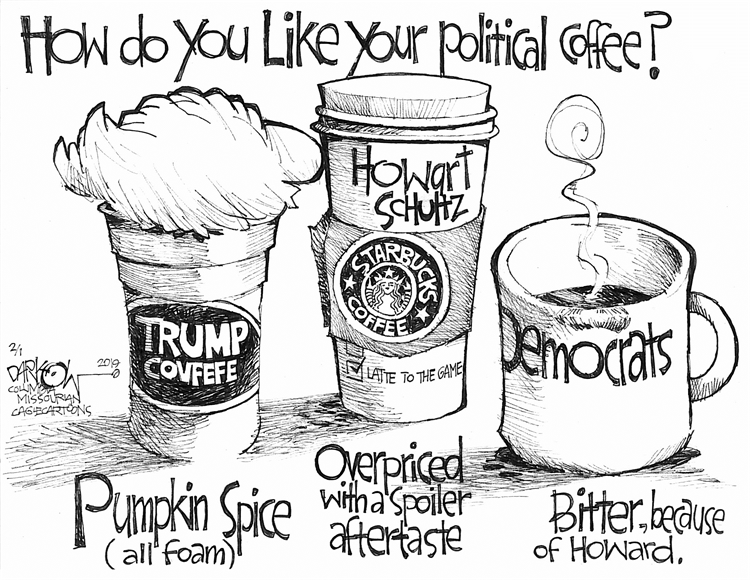
In my “senior years,” I find that two cups of coffee a day are plenty, especially at Starbucks prices.
As John Darkow suggests (above), that third cup begins to leave a bitter aftertaste, no matter whether you perk it or drip it, spice it or “latte” it.
It is the same with my politics.
Two political parties, as flawed as they both may be (or as good as one may be and as bad as the other one may be — you decide), are more than enough to keep me entertained, or disgusted.
While “third parties” have their merits, such as to give voters the opportunity to support social or political views and changes not espoused by the two major parties (or just to cast a “protest vote”) and while they, at times, can influence the mainstream candidates to include some of their goals in their platforms, generally and historically third parties and their presidential candidates have not been very successful.
In fact, since 1920, only three third-party candidates have been able to win even a single electoral vote.
True, third parties have not been “very successful.” But that comes with an important caveat. In a spoiler role, third party candidates have at times been very successful at influencing elections and may have even determined the outcome of at least one recent presidential election, perhaps two.
Successful or not, third parties (there are more than 30 third parties in the U.S.), are here to stay even if sometimes they leave a bitter aftertaste in the mouths of members of the two mainstream parties.
Already for the 2020 elections, more than a dozen third party or independent candidates have announced their candidacy or expressed an interest in running in 2020.
Which brings me back to coffee, to Starbucks and more specifically to its former chief executive Howard Schultz.
A long-time Democrat and one of the most progressive chief executives in corporate America, Schultz has expressed an interest in running for president as an independent and is expected to formally announce such in the coming weeks, after concluding his present “listening tour.”
Schultz’s presidential ambitions have not been very well received by Democrats who fear a re-run of the 2000 presidential election, this time with even more catastrophic results: the re-election of Trump. They believe that Schultz’s politics have shifted sufficiently to the center to attract more moderate Democrats and, thus, help Trump win re-election.
To those who believe that Schultz’s more centrist views would also garner Republican voters fed-up with Trump, Warren Buffet has the following warning:
I think generally [that] third-party candidates, they’re going to hurt one side or the other, and they’re more likely to hurt the side that they actually favor, because they’re closer to that view and so they pull more people away that would otherwise go with the second-best with that view.
However, Aaron Blake at the Washington Post – in-between interesting comments, poll results and statistics about independents and Americans’ thoughts on third parties — sees a silver lining in all this.
Blake notes that with a Schultz’s candidacy, “there could be more of a market among disaffected Republicans than Democrats (depending on whom their nominee is).”
Regardless, if I must have a third cup of coffee in 2020, I would prefer that such third cup definitely be “Republican-flavored.”
Sadly, absent some cataclysmic event between now and the 2020 primaries (Obviously, it would have to be more serious than just Trump being Trump, standing in the middle of Fifth Avenue and shooting somebody), Trump will be the Republican Party’s 2020 presidential nominee.
That is, unless during the general election a courageous, truly independent, Republican person of character joins the “honor roll of those who have shown seemingly futile courage.” Because, as Michael Gerson wrote last November:
Someone on the American right must contend that racism and sexism violate the promise at the heart of the United States. Someone must be offended when national ideals are debased by cruelty and corruption. Someone must be willing to defy good political sense in a great political cause.
















